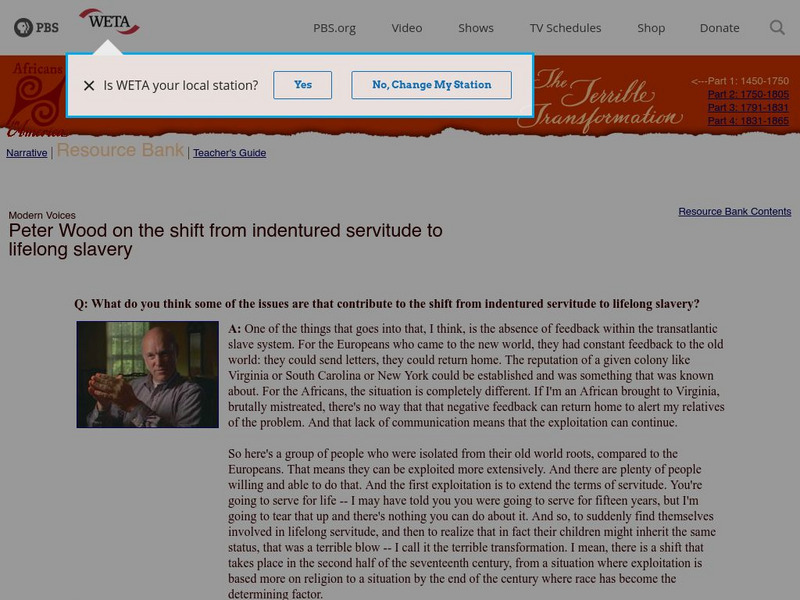Curated OER
Comparing SLaves and Servants in Colonial New York
Young historians compare and contrast differences in the laws that regulated the activities of slaves and servants. They review and analyze a series of primary source documents to explain the social constructs related to slaves and...
Big History Project
Human Migration Patterns II
While humans have always been on the move, the period between 1400 and 1800 saw vast migrations of people between the East and the West. These migrations—whether through slavery or a desire to colonize new lands—shaped the modern world....
Benjamin Franklin Tercentenary
Franklin’s Philadelphia: Another Point of View
While Benjamin Franklin enjoyed fame and success in colonial Philadelphia, that was not the experience of all coming to the British colonies. Young scholars trace the life of an indentured servant using a scholarly biography and reading...
Library of Virginia
Antebellum Freedom
From indentured servitude to involuntary race-based servitude, slavery has taken many forms in American history. Class members examine three manumission petitions that reveal how the rights of African Americans and African American...
EngageNY
Grade 9 ELA Module 4, Unit 1, Lesson 23
In "How We Researched and Wrote this Book," the final essay in Sugar Changed the World: A Story of Magic, Spice, Slavery, Freedom, and Science, authors Aronson and Budhos discuss their research methods and purpose in writing the text....
EngageNY
Grade 9 ELA Module 4, Unit 1, Lesson 22
Class members read "Satyagraha," the concluding section of Marc Aronson and Marina Budhos' Sugar Changed the World: A Story of Magic, Spice, Slavery, Freedom, and Science, and analyze how the authors support their claim that terrible...
EngageNY
Grade 9 ELA Module 4, Unit 1, Lesson 21
Class members read the chapter, "Serfs and Sweetness" from Sugar Changed the World, and identify the central idea that the development of beet sugar and modern farming technology changed the reliance on the plantation system and made...
EngageNY
Grade 9 ELA Module 4, Unit 1, Lesson 20
After comparing the working conditions of the enslaved people to those of the Indian indentured workers on the sugar plantations, class members examine the conditions and the actions of specific historical figures that Marc Aronson and...
Center for History Education
The Tobacco Economy: How did the Geography of the Chesapeake Region Influence its Development?
Explore the relationship between geography and economy using primary sources. After examining wills, advertisements, and other primary sources, individuals consider how the Chesapeake Region came to be home first to indentured servants,...
Curated OER
Daily Life in Virginia
Students explore colonization in North America. In this United States history instructional activity, students view a PowerPoint presentation about indentured servants and slave labor, then construct a related Venn diagram....
Curated OER
Early Colonial Labor Force: Indentured Servants and Slaves
Students study the labor force used during Colonial America. In this Colonial America lesson plan, students discuss labor types used in the colonies. Students read about indentured servants and the use of African slaves....
Curated OER
A Comparison of Indentured Servants and Slaves
Sixth graders examine and compare the lives of slaves and indentured servants using primary sources and the historical fiction books, "Molly Bannaky and Barefoot." They analyze and compare advertisements for runaway slaves. Students...
Other
United States History: Ch. 3 Sec. 1: The Southern Colonies [Pdf]
A chapter from a history text that looks at the development of the Southern Colonies. It discusses the Southern agricultural economy that relied on slave labor, tobacco as a cash crop, Southern society, indentured servitude, Bacon's...
Jamestown-Yorktown Foundation
History Is Fun: Tobacco and Labor [Pdf]
A clear explanation of the system of indentured servitude that supplied Virginia tobacco plantations with the labor force they needed in order to manage their crops. Explains how such servants were able to earn their own land, and how...
Library of Virginia
Virginia Memory: Petition of Phillip Gowen
This instructional activity explores the practice of indentured servitude in colonial Virginia. Students examine a petition by Phillip Gowen, an African American indentured servant, who asked the governor of Virginia to release him from...
The History Cat
The History Cat: History of Colonial America: Jamestown Colony
Describes the struggles of the Jamestown Colony to survive in its first years. Many died from disease and starvation, and things only began to turn when the colonists started to grow tobacco. The use of indentured servants and later,...
PBS
Pbs: Africans in America: Shift From Indentured Servitude to Lifelong Slavery
This discussion by Prof. Peter Wood of Duke University explores what may have allowed the shift from indentured servitude to lifelong slavery for Africans and their children. Click on Teacher's Guide for teacher resources.












![United States History: Ch. 3 Sec. 1: The Southern Colonies [Pdf] eBook United States History: Ch. 3 Sec. 1: The Southern Colonies [Pdf] eBook](https://static.lp.lexp.cloud/images/attachment_defaults/resource/large/FPO-knovation.png)

